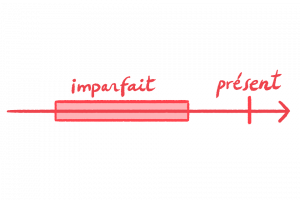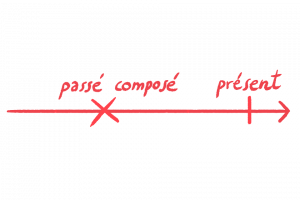Imperfect or passé composé? in French
Read more about how to use Imperfect or passé composé? in French.
Feel the need to learn new grammar tips fast? Learn French online and test your grammar knowledge with Frantastique for free.
TEST YOUR FRENCH
Free trial and no commitment to buy
4,7 on App Store, Play Store and Trustpilot
More than 8 million learners worldwide
Imperfect or passé composé?
The passé composé and the imperfect tenses both describe actions that occur in the past. The question is when they should be used. This table should have the answers.
| Imperfect | Passé composé |
|---|---|
 |  |
| Used for memories, or past habits and descriptions. The equivalent of 'was', 'would' or 'used to' in English. Quand j’étais petit, j’allais souvent en vacances à la mer. When I was small, I would often go on trips to the seaside. Dans le restaurant, la serveuse préparait des cafés et le patron lisait le journal. In the restaurant, the waitress prepared the coffees and the owner read the paper. | For events that occur at a precise point in the past. The equivalent of the English simple past tense. Hier, je suis allé à la mer et j’ai mangé une glace. Yesterday, I went to the seaside and I ate an ice-cream. Dimanche, je me suis levé à 11 h et j'ai préparé du café. On Sunday, I got up at 11am and I made a coffee. |
| For ongoing past actions with no specified completion. We usually translate this to 'was + ing'. Hier, à 5 h 30, je dormais. Yesterday at 5.30am, I was sleeping. | For actions that started and ended in the past. The English simple past tense is used here. J’ai dormi jusqu’à 5 h 30. I slept until 5.30. |
| With the following time expressions: souvent (often), d'habitude (usually), tous les jours (every day), chaque lundi (every Monday), etc. Chaque vendredi nous allions au marché à pied. Every Friday we would walk to the market. Avant je sortais le chien tous les matins. Previously, I used to take the dog out every morning. | With the following time expressions: pendant 3 jours (for 3 days), l’année dernière (last year), à 11 h (at 11 o'clock), soudain (suddenly), une fois (once), deux fois (twice), etc. L’année dernière l’hiver a été très froid. Winter last year was very cold. Je traversais la route lorsqu’une voiture m’a renversé. I was crossing the road when a car hit me. |
Still having trouble with 'Imperfect or passé composé?'? Master the rules of French grammar and improve your French level thanks to our online French lessons Frantastique. We're offering a 7-day free trial, so what are you waiting for?
What our users say:
Looking to improve French for beginners? Frantastique provides effective and fun training!
Tips for learning 'Imperfect or passé composé?'? Share them with us!
